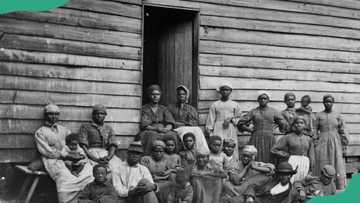Colonialism in Nigeria: positive and negative impact of colonization
Like some other African countries, Nigeria underwent colonization by the British. In 1914, Lord Fredrick Lugard signed a document consolidating the Protectorate of Southern Nigeria and the Northern Nigeria Protectorate, effectively creating the Protectorate of Nigeria. Forty-six years later, the country attained independence from British rule. During this colonial era, the country underwent numerous changes, some of which have lasted to date. Colonialism in Nigeria had both positive and negative impacts. Professor Sati Umaru Fwatshak, from the University of Jos, offers valuable perspectives on both the positive and negative impact of colonialism in Nigeria through his expertise in History.

Source: UGC
TABLE OF CONTENTS
- The positive and negative impact of colonialism in Nigeria
- How did British colonization influence the Nigerian civil war?
- What was the Nigerian government before colonization?
- How has Nigerian clothing changed after the European colonization?
- Why was Nigeria colonized?
- How was Nigeria colonised by the British?
- What was Nigeria called before?
- How long was Nigeria a colony?
- What are the negative effects of colonization in Nigeria?
- What was the impact of colonialism on the Nigerian economy?
Colonialism in Nigeria was a significant historical period that deeply impacted the country's social, political, economic, and cultural development. The colonial era in Nigeria began in the late 19th century and lasted until Nigeria gained its independence.
The positive and negative impact of colonialism in Nigeria
Nigeria gained its independence from British colonial rule on October 1, 1960. However, the legacy of colonialism persisted, and the country faced numerous challenges in the post-colonial era, including political instability, ethnic tensions, and economic disparities. Here is a look at the positive and negative effects of colonialism in Nigeria.
Positive effects of British rule in Nigeria
While widely viewed in a negative light, colonialism did have some positive impacts. Here are some of the advantages of colonialism in Nigeria.
1. Introduction of a modern idea of government
Before the colonial era, Nigeria was largely governed through a somewhat unstructured system of kingdoms and empires. As with other countries before colonization, Nigeria's system of governance relied on unwritten laws that posed a lot of problems.
With colonialism came a structured form of government. Like in other countries, the governance system Nigeria adopted was based on what the Britons used at the time.
For example, the post-colonial systems of governance in the country saw a clear separation of powers between different arms of government, a fact that played a significant role in conflict avoidance. Additionally, the idea of the country's written constitution arose from colonization.
2. Improved healthcare

Source: UGC
Before the entry of the British into Nigeria, the country experienced significantly high infant mortality rates. These were attributable to underdeveloped healthcare systems. At the time, some of the ailments could not be identified, making it tricky to come up with a remedy.
When the British came, the situation improved through improved literacy and knowledge. Infant mortality was reduced since citizens could tell the causes of certain diseases as well as their cures. It is worth noting that healthcare improvement, like other advantages of colonialism, happened through imperialism.
3. Introduction of money currencies
In pre-colonial Nigeria, the prevalent form of business was barter trade. This involved the exchange of goods with other goods, a system ridden with numerous challenges. The colonialists then introduced money currencies, making it easier to trade and do business.
In 1912, the British introduced the first silver coins in the country. Around the same time, the West African Currency Board was created. Besides the money currency, the British also introduced the banking system in Nigeria, further simplifying trade in the country.
4. Infrastructural development
Like in many other African countries, the colonialists introduced numerous infrastructural developments in Nigeria. These include electricity networks, rail lines, seaports, bridges, and roads. While most of the original colonial-era projects no longer exist, they formed the basis on which the country's modern-day projects are based.

Read also
Insecurity: Concerns as Defence HQ uncovers fresh activities of foreign terrorists, details emerge
People in pre-colonial Nigeria relied on traditional modes of transport, such as walking on foot and using animals. The infrastructural changes significantly impacted the citizens' lives, making moving from one point to another easier and faster.
5. Improved literacy

Source: UGC
Literacy is one of the most significant benefits of colonial rule in African countries, Nigeria included. When the colonialists came to the country, they taught the natives how to speak, read, and write in English.
With the improved literacy levels, the natives pursued the numerous opportunities that involved communicating with other English speakers. Literacy benefits continue to be felt in modern-day Nigeria. Unsurprisingly, the country's education system is still largely based on what was introduced during the colonial era.
6. The creation of a huge political unit
Creating a large and unified system of government helped the country develop faster. Before the imperialists came, the country was governed through divided systems of kingdoms, empires, and other small groups.
These administration systems were significantly different even though the regions they represented were quite close geographically.
The systems merged during colonization resulted in faster development since decisions could now be made easily.
During an interview with Legit.ng, Sati Umaru Fwatshak, a history professor at the University of Jos, noted that colonialism introduced modern infrastructure to Nigeria. However, he emphasized that these advancements were not aimed at indigenous development but instead acted as tools for the exploitation and expropriation of Nigeria's resources by colonial powers. He said:
I belong to the Africanist/nationalist school, and it is tough to say colonialism had a positive impact on Nigeria. But for people in secondary schools, we can say colonialism had both negative and positive effects.
At that level (secondary school), where our teaching and engagements are narrative type, not analytical, we say colonialism brought modern infrastructure such as Western education, hospitals, roads, railways, and so on.
But the fundamental issue for us on this side (Africanist/nationalist school) is that the colonialists didn't fix these things to bring development to Nigeria or to any part of Africa where colonialism was involved. However, the intention was to extend or exploit and expropriate Nigerians' resources maximally.
So, the railways complemented the roads, or the roads complemented the railways. They all led to the seaports, which supported an export-driven economy to export our natural resources such as groundnuts, cotton from the north, rubber, cocoa, and palm oil from the south-east and south-west.
Negative effects of British colonialism in Nigeria
Despite the numerous positive impacts of the colonization of Nigeria, there were also several negative effects. Here are the main disadvantages of colonialism in Nigeria.
1. Constant war and conflict
Before the entry of the British into the country, the citizens enjoyed what can be described as a prevailing sense of harmony. When the country was overrun in the name of imperialism, it marked the beginning of conflict and war.
These conflicts were largely fueled by the colonizers in a well-thought divide-and-rule strategy. Therefore, colonial rule disrupted the country's peace for quite some time.
2. Economic dependence and resource exploitation
While colonialism brought infrastructural and technological development to Nigeria, it was also a form of extreme exploitation. The basic idea behind colonization had aspects of economic dependency baked right into it. The British took the country's resources, land and mineral included, leaving the natives dependent on them to generate funds.
Additionally, the imperialists ensured that the natives did not get positions in the running of metropolitan industries, leaving them dependent on the colonial masters.
3. Loss of culture and identity
When the colonialists took over the country's rule during the colonial era, the natives suffered a massive culture and identity loss. The British brought and imposed their culture, language, behaviour, beliefs, and other ways of life on the Nigerians.
This then led to the natives abandoning some of their customs and culture in favour of those brought by the colonizers. For most natives, though, the conformity to the new way of life was more out of fear of the colonialists than a belief in their ways of life.
Eventually, after 46 years of Nigerian colonization, the natives lost significant parts of their culture and identity, which were never fully regained even after the country attained independence from colonial rule.
This is one of the main subjects in Chinua Achebe's highly acclaimed book Things Fall Apart. The British viewed the local culture as inferior and disregarded everything the Africans believed in. This resulted in the imperialists changing everything they deemed unsuitable.
The natives' sports, music, dress code, education systems, naming, and religions were all replaced by those the British considered 'right.'
4. Loss of land
One of the biggest reasons for British colonialism in Nigeria was the abundant resources. The British needed the land to create massive plantations for their economic gain.
When they entered the country, the colonialists forcefully grabbed land from the natives. This left most natives in colonial Nigeria with little or no land at individual and community levels. With the loss of land, other problems, such as hunger and poor living conditions, followed.
5. Slave trade and humiliation

Source: UGC
With the introduction of colonialism into Nigeria, the twisted idea of the slave trade followed suit. At the time, the colonial masters needed slaves to work in their home countries or the colonies. Additionally, imperialism reduced the status and prestige accorded to Nigerian leaders.
The colonial masters controlled native leaders through fear and humiliation. Those who did not play to the master's tune would face dire consequences. Before Nigeria was officially declared a British colony, the British had carried out slave trade in the country for a while.
The Portuguese paved the way for the slave trade in Nigeria back in the 15th century. The slave traders would use the captured Nigerians as currency for purchasing weapons and other items and using them as soldiers during the war.
Professor Sati also explored the adverse effects of colonialism, highlighting various socio-economic and political challenges that persist in Nigeria today. He said:
At the level of education, the purpose was to train junior-level human labor power to fit into the colonial administrative system. At the administrative level, colonialism created political centralization using the emirate structure through the indirect rule system, which was quite different from the structure in some other areas.
It was possible to find centralized administration in places where empires and kingdoms had developed. However, in the Igbo areas, the central Nigerian areas where minorities didn't create empires and kingdoms, they were forced to adopt centralized administration, and political centralization came to be seen as a mark of political advancement. And you can see that that idea still haunts us today, where we have a federal government superior to state governments and state governments superior to local ones.
So, the autonomy of people was compromised. Of course, that has not entirely healed. If you read specific advanced literature, for example, Moses Ochonu's Colonialism by Proxy, you will see vehement opposition to using the emirate system in non-centralized societies. The struggle continues today because the memory of that relationship keeps on haunting the people of Central Nigeria and the emirate societies, as both struggle with democracy today regarding power sharing.
A look at our cultures under the influence of colonialism, when you combine Westernisation with Christian missionary influence, shows that many of us today are at a crossroads. We are neither indigenously African/Nigerian: we don't significantly identify with our Nigerian roots; neither are we completely Westernized. So we're just caught in between. And we don't have a cultural identity that is very, very strong.
And as my generation, which retains some basics of our cultures, fizzles out, our children hardly can speak our local language. Indeed, even if they do, they struggle with it; they relate to our cultures more as entertainment. So with language loss, with culture loss, it is identity loss, and we're losing this to Westernisation, and Westernisation was founded in the period of colonial rule.
How did British colonization influence the Nigerian civil war?
The Nigerian Civil War, also known as the Nigerian-Biafran War, occurred between July 1967 and January 1970. The war was between the Republic of Nigeria and the Republic of Biafra, a secessionist nation that had declared independence from Nigeria.
The British encouraged this secession, worsening the war even further. Additionally, the colonial policies at the time did not consider the complex cultures prevalent in the warring regions. The policies then forced warring groups to live in proximity, worsening the situation.
What was the Nigerian government before colonization?
From about the 12th century CE until Nigeria's colonial era, the country was largely a collection of states, kingdoms, and empires with trade and political systems. Some of the most noticeable administration systems at the time were the Hausa states of Gobir, Zaria, Kano, and Katsina and the Jukun states of Wukari, Pinduga, Kona, and Kwararafa.
How has Nigerian clothing changed after the European colonization?
Before the natives began trading with Europeans, the country's traditional costumes were largely made from materials at hand. These included hand-woven textiles, leather, feathers, seeds, and other items made from natural fibres. In modern-day Nigeria, the prevalent fashion is heavily borrowed from the colonialists.
Why was Nigeria colonized?

Source: UGC
The colonialists targeted Nigeria primarily due to its abundant natural resources. They wanted products such as palm oil, groundnuts, cocoa, cotton, and palm kernel, all of which were abundant in the West African nation.
The British also wanted to safeguard their trade interests in the region. Taking the country meant that the Brits effectively prevented any formal claims of the region by other colonial powers such as France and Germany.
How was Nigeria colonised by the British?
Nigeria was established as a British colony in 1884 at the renowned Berlin Conference, during which Africa was subdivided into territories to be taken by Europeans. The British then seized the country through military force, strategic alliances and the collaboration of some of the natives.
The rulers then put in place a system of governance known as an indirect rule to further strengthen their foothold on the land. Under this rule, administration was left to traditional chiefs who operated under the strict guidance of the colonial rulers.
What was Nigeria called before?
The country known as Nigeria today dates back to 1914, when Lord Fredrick Lugard grouped the constituent protectorates into one. Before then, the region was known as the Benin Empire between 1440 and 1897. The locals used to call it Bini.
Other common names included the Kingdom of Benin, Kingdom of Oyo, and Kanem-Borno. The country's name is derived from the River Niger, one of the country's defining physical features.
How long was Nigeria a colony?
The Colony and Protectorate of Nigeria existed for 46 years between 1914 and 1960. The colony was created through the consolidation of the Colony and Protectorate of Southern Nigeria and the Northern Nigeria Protectorate. In 1960, the country attained independence from British rule.
What are the negative effects of colonization in Nigeria?
Some of the negative impacts of colonialism include constant war and conflict, economic dependence and resource exploitation, loss of culture and identity and slave trade and humiliation.
What was the impact of colonialism on the Nigerian economy?
Colonialism profoundly impacted the Nigerian economy, shaping its structure and development in significant ways. One major impact was infrastructure development projects such as railways, roads, and ports.
Like in other countries under imperialist rule, colonialism in Nigeria resulted in numerous positive and negative impacts. Critics of this rule argue that the negative impacts outweigh the positive ones, while supporters argue otherwise.
Legit.ng recently published an article listing some of the cheapest universities in Nigeria. The quality and value of a university education depend on various factors, and the cost of tuition is just one of them.
There are numerous universities in Nigeria's education sector today. These institutions are divided into government-owned institutions and private ones owned by individuals, corporate bodies, and religious institutions. Read on to discover some of the cheapest federal universities in Nigeria you can afford.
Source: Legit.ng

Jackline Wangare (Lifestyle writer) Jackline Simwa is a content writer at Legit.ng, where she has worked since mid-2021. She tackles diverse topics, including finance, entertainment, sports, and lifestyle. Previously, she worked at The Campanile by Kenyatta University. She has more than five years in writing. Jackline graduated with a Bachelor’s degree in Economics (2019) and a Diploma in Marketing (2015) from Kenyatta University. In 2023, Jackline finished the AFP course on Digital Investigation Techniques and Google News Initiative course in 2024. Email: simwajackie2022@gmail.com.

Mary Ugbodaga (Lifestyle Journalist) Mary Ugbodaga is a Legit.ng journalist with 7 years of experience in journalism and media communications. She graduated from Covenant University in 2018 with a Bachelor's degree in Mass Communication/Media Studies. Mary previously worked as a journalist at TheCable, CNBC AFRICA, Voice of Nigeria, KPMG Nigeria. Email: mary.ugbodaga@corp.legit.ng.














